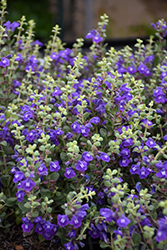It's all about ...
plants

Smoky Hills Skullcap
Scutellaria resinosa 'Smoky Hills'
Height: 10 inches
Spacing: 12 inches
Sunlight:
![]()
Hardiness Zone: 4a
Other Names: Resinous Skullcap, Prairie Skullcap
Description:
A woody-based shrubby perennial, named for the Smoky Hills of Kansas, features spikes of showy, deep purple-blue flowers striped in white; spectacular when in mass bloom; lovely in the garden, or along low borders; drought tolerant, with low water use
Ornamental Features
Smoky Hills Skullcap features showy spikes of purple pea-like flowers with blue overtones and white stripes rising above the foliage from early summer to early fall. Its oval leaves remain grayish green in colour throughout the season.
Landscape Attributes
Smoky Hills Skullcap is an herbaceous perennial with an upright spreading habit of growth. Its relatively fine texture sets it apart from other garden plants with less refined foliage.
This plant will require occasional maintenance and upkeep, and is best cut back to the ground in late winter before active growth resumes. It is a good choice for attracting bees to your yard, but is not particularly attractive to deer who tend to leave it alone in favor of tastier treats. It has no significant negative characteristics.
Smoky Hills Skullcap is recommended for the following landscape applications;
- Mass Planting
- Rock/Alpine Gardens
- Border Edging
- General Garden Use
- Naturalizing And Woodland Gardens
- Container Planting
Planting & Growing
Smoky Hills Skullcap will grow to be about 10 inches tall at maturity, with a spread of 14 inches. When grown in masses or used as a bedding plant, individual plants should be spaced approximately 12 inches apart. Its foliage tends to remain low and dense right to the ground. It grows at a fast rate, and under ideal conditions can be expected to live for approximately 10 years. As an herbaceous perennial, this plant will usually die back to the crown each winter, and will regrow from the base each spring. Be careful not to disturb the crown in late winter when it may not be readily seen!
This plant should only be grown in full sunlight. It is very adaptable to both dry and moist growing conditions, but will not tolerate any standing water. It is considered to be drought-tolerant, and thus makes an ideal choice for a low-water garden or xeriscape application. This plant should not require much in the way of fertilizing once established, although it may appreciate a shot of general-purpose fertilizer from time to time early in the growing season. It is not particular as to soil pH, but grows best in sandy soils. It is somewhat tolerant of urban pollution. Consider covering it with a thick layer of mulch in winter to protect it in exposed locations or colder microclimates. This is a selection of a native North American species. It can be propagated by division; however, as a cultivated variety, be aware that it may be subject to certain restrictions or prohibitions on propagation.
Smoky Hills Skullcap is a fine choice for the garden, but it is also a good selection for planting in outdoor pots and containers. It is often used as a 'filler' in the 'spiller-thriller-filler' container combination, providing a mass of flowers against which the larger thriller plants stand out. Note that when growing plants in outdoor containers and baskets, they may require more frequent waterings than they would in the yard or garden. Be aware that in our climate, most plants cannot be expected to survive the winter if left in containers outdoors, and this plant is no exception. Contact our experts for more information on how to protect it over the winter months.
This plant is not reliably hardy in our region, and certain restrictions may apply; contact the store for more information.
